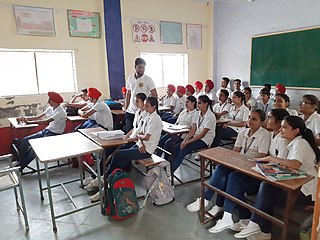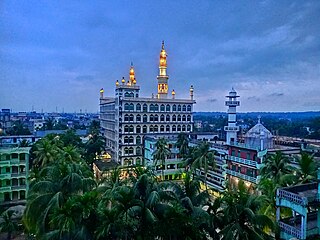
A college is an educational institution or a constituent part of one. A college may be a degree-awarding tertiary educational institution, a part of a collegiate or federal university, an institution offering vocational education, or a secondary school.

Education in India is primarily managed by the state-run public education system, which falls under the command of the government at three levels: central, state and local. Under various articles of the Indian Constitution and the Right of Children to Free and Compulsory Education Act, 2009, free and compulsory education is provided as a fundamental right to children aged 6 to 14. The approximate ratio of the total number of public schools to private schools in India is 10:3.
Rabwah, officially known as Chenab Nagar, is a city in Chiniot, Punjab, Pakistan on the bank of Chenab River. It was the headquarters of the Ahmadiyya Muslim Community since September 20, 1948 when the community relocated from Qadian, India to the newly created state of Pakistan, where the Community leased the area of present-day Rabwah from the government to establish its home. This continued until 1984 and the establishment of Ordinance XX. In 1984, the headquarters were moved to the United Kingdom with Mirza Tahir Ahmed, first to London and then in 2019 to the Islamabad compound in Tilford, Surrey.
UGC NET or NTA-UGC-NET, is the examination for determining the eligibility for the post of assistant professor and/or Junior Research Fellowship award in Indian universities and colleges. The examination is conducted by National Testing Agency on behalf of University Grants Commission. Until July 2018, the Central Board of Secondary Education (CBSE) conducted the UGC NET exam, which the NTA has been conducting since December 2018. Currently, the exam is being conducted twice a year in the months of June and December in online mode.
Chak Enayetnagar is a census town and a gram panchayat within the jurisdiction of the Bishnupur police station in the Bishnupur II CD block in the Alipore Sadar subdivision of the South 24 Parganas district in the Indian state of West Bengal.

Sambhal(listen) is a city located in the Sambhal district of Uttar Pradesh state in India. The city lies approximately 158 kilometres (98 mi) east of New Delhi and 355 kilometres (220 mi) north-west of state capital Lucknow.
Department of Higher Education is the department under Ministry of Education, that oversees higher education in India.
Darul Uloom Al Arabiya Al Islamiyya, better known as Darul Uloom Bury, was established in 1979 and is the oldest Islamic seminary in the United Kingdom. Located in Holcombe, Bury, it is based on the Dars-e-Nizami syllabus found throughout the world. It was founded by the late Hadhrat Moulana Yusuf Motala.

The Union Government set up the National Commission for Minorities (NCM) under the National Commission for Minorities Act, 1992. Six religious communities, viz; Muslims, Christians, Jains, Sikhs, Buddhists and Zoroastrians (Parsis) have been notified in Gazette of India as minority communities by the Union Government all over India. Original notification of 1993 was for five religious communities; Sikhs, Buddhists, Parsis, Christians and Muslims, later in 2014, Jains community was also added. As per Census 2001, these six communities consists of 18.8% of the country's population.

Arshadul Qadri was a Sunni Islamic scholar, author and missionary activist in India associated with the Barelvi movement who established several educational institutions and organizations in India.

The Ministry of Education is a ministry of the Government of India, responsible for the implementation of the National Policy on Education. The ministry is further divided into two departments: the Department of School Education and Literacy, which deals with primary, secondary and higher secondary education, adult education and literacy, and the Department of Higher Education, which deals with university level education, technical education, scholarships, etc.

Al-Jāmiʿah al-Ahliyyah Dār al-ʿUlūm Muʿīn al-Islām, popularly known as the Hāṭhazārī Madrasa or the Great Madrassah, is a Qawmi institution of Hathazari, located in Bangladesh's Chittagong District. Established in 1901, it is the largest and oldest Deobandi seminary in the country. According to a 2009 National Bureau of Asian Research report, the highly reputed institution ranks among top ten madrasa in the subcontinent.
Educational accreditation is a quality assurance process under which services and operations of educational institutions or programs are evaluated and verified by an external body to determine whether applicable and recognized standards are met. If standards are met, accredited status is granted by the appropriate agency.

India has a publicly funded higher education system that is the third largest in the world, next to the United States and China. The main governing body at the tertiary level is the University Grants Commission, which enforces its standards, advises the government, and helps coordinate between the centre and the state. Accreditation for higher learning is overseen by 15 autonomous institutions established by the University Grants Commission (UGC).
Chitra Jayant Naik (1918–2010) was an Indian educationist, writer, social worker, the chairperson of the Indian Institute of Education and the expert member of the Planning Commission of India. She was the chairperson of the Non-formal Education Committee set up by the Ministry of Human Resource Development and was a member of the National Literacy Mission. The Government of India awarded her the fourth highest Indian civilian honour of Padma Shri in 1986.

The West Bengal Board of Madrasah Education is the state government administered autonomous examining authority for affiliated and recognized madrasahs in West Bengal, India. Perhaps among the oldest post-secondary boards in India, it is the only madrasah board that is recognized by the Government of India.It is one of the parastatal organization of the Minority Affairs and Madrasah Educatino Department. The West Bengal Board of Madrasah Education is the West Bengal state government administered autonomous examining authority for the High Madrasah examination of West Bengal, India. It has come into force by the West Bengal Board of Madrasah Education Act-1994.

The academic growth of Perintalmanna is best reflected with its number of educational institutions, including the Malappuram Centre of Aligarh Muslim University(established in 2012) at Chelamala. There is a long list of schools and colleges spread all over Perintalmanna.
MGM PG College Sambhal, Uttar Pradesh is a recognised college. MGM PG College Sambhal, is also known as Mahatma Gandhi Memorial Post Graduation Degree College.
Ahmad Hasan Amrohi was an Indian Muslim scholar and freedom struggle activist who served as the first principal of Madrasa Shahi in Moradabad. He was an alumnus of Darul Uloom Deoband and among the founding members of Mahmud Hasan Deobandi's Thamratut-Tarbiyat. He was an authorized disciple of Imdadullah Muhajir Makki.










